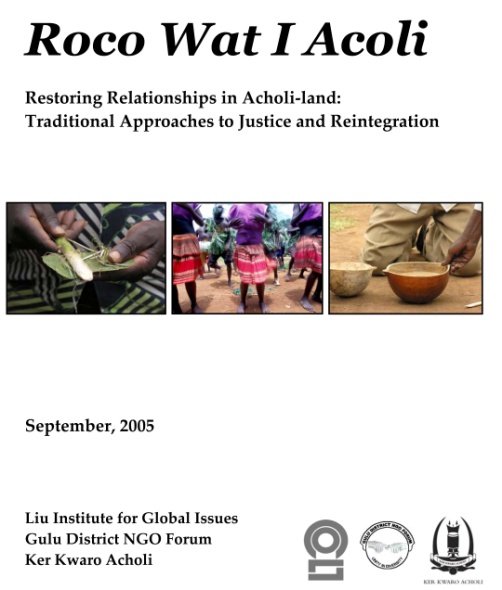
The 19 year conflict in northern Uganda has resulted in one of the world’s worst, most forgotten humanitarian crisis: 90 percent of the affected-population in Acholi is confined to internally displaced persons camps, dependant on food assistance. The civilian population is vulnerable to being abducted, beaten, maimed, tortured, raped, violated and murdered on a daily basis. Over 20,000 children have been abducted by the Lord’s Resistance Army (LRA) and forced into fighting and sexual slavery. Up to 40,000 children commute nightly to sleep in centres of town and avoid abduction. Victims and perpetrators are often the same person, and currently there is no system of accountability for those most responsible for the atrocities. Given the scale and scope of the crisis, it is not surprising that an intense debate on the most appropriate strategy to realize peace and justice has emerged.
When the Chief Prosecutor at the International Criminal Court (ICC) announced its intention to investigate the LRA in 2004, many local leaders in northern Uganda were opposed to the initiative. Traditional, religious and civil society leaders have argued that the ICC places ‘their’ children at greater risk, and threatens to further damage their cultural identity and beliefs. Traditional justice, based on restorative principles, is widely supported as a favorable alternative to the punitive approach of the Court. A number of advocates, therefore, argue the Court should cease its current investigation until local approaches are given an opportunity to work, or until peace is realized in the region. Despite this, very little is known about traditional justice in Acholi beyond its normative dimensions.
This report, Roco Wat I Acoli, provides a much needed analysis of what traditional justice in northern Uganda is, how it is currently practiced and what value it could add. It documents existing practices of traditional justice in 16 internally displaced persons (IDP) camps in Northern Uganda. It further examines how some of these rituals have been adapted to promote the reintegration of former rebels. It does so in order to provide an initial assessment of whether or not traditional rituals and ceremonies could be further adapted in the context of the enduring 19-year old conflict.
The findings suggest that the Acholi people continue to hold sophisticated cultural beliefs in the spirit world, which greatly shape their perceptions of truth, justice, forgiveness and reconciliation. Nevertheless, traditional cultural practices and the role of Elders, Mego and Rwodi have been severely restricted by the conflict and circumstances of displacement. In the words of one Elder, ‘these children don’t know how to be Acholi’. Since their re-institutionalization in 2000, traditional leaders, through Ker Kwaro Acholi, have attempted to revitalize cultural rituals and practices, and to reach out to the population to encourage the safe reintegration of formerly abducted persons. Findings suggest that this initiative has had varying degrees of success on the ground, largely dependant upon the camp setting, leadership within the camp, as well as the individual circumstances the formerly abducted person (FAP) returns to, such as family life. Likewise, the approaches are often ad-hoc and lack coordination with other existing efforts, reflecting an institutional weakness of the organization.
To access the report, click here
